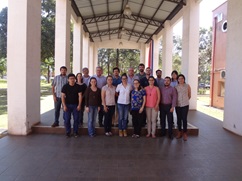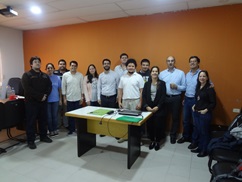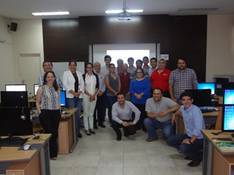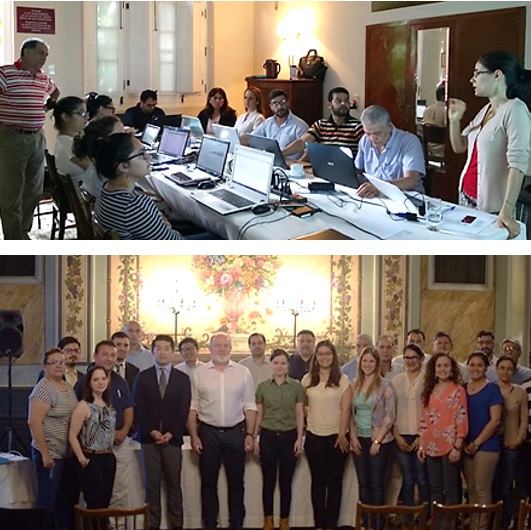Paraguay
Paraguay’s economy is dependent on the agriculture and livestock sectors, which are highly vulnerable to climate change. More than 80 percent of farmers are small holders with properties of less than 20 hectares with limited capacity for adaptation to climate change. It is therefore important that the future impacts of climate change are assessed for evidence based adaptation planning and support.
Since July 2016 FAO has partnered with the Ministry of Agriculture and Livestock (MAG) and other government agencies in Paraguay through AMICAF. Component 1 and 2 of the AMICAF approach are being implemented until February 2018.

Workshops
Final workshop 30 January 2018
Final workshop 30 January 2018
The AMICAF Paraguay’s midterm workshop was held on 30 January 2018 in Asuncion, Paraguay.
Dr. Marcos Medina, Minister of Agriculture and Livestock, Ms. Yoshie Nakatani, from the Japanese Embassy in Paraguay, and the FAO Representative in Paraguay delivered opening remarks.
Around 40 participants attended the event including policy makers from the Ministry of Agriculture and Livestock (MAG), the Ministry of the Environment (SEAM), the Ministry of Planning (STP), experts from DINAC (National Met Office), universities, and the FAO AMICAF team.
During the workshop, local research teams presented their findings and several policy implications. These will be useful for policy planning and follow-up research in Paraguay.

Midterm workshop 7 November 2017
Midterm workshop 7 November 2017
The AMICAF Paraguay’s midterm workshop was held on 7 November 2017 in Asuncion, Paraguay with the project team including participants from the Ministry of Agriculture and Livestock and the Secretary for Technical Planning.
The aim of the workshop was to share the preliminary findings of the AMICAF project in Paraguay with the project members and to discuss how the project can feed into a bigger national policy programme in the future.
To support the climate change impact assessments in Paraguay, AMICAF organized five capacity development trainings in 2017. The trainings covered socio-economic impacts of climate change, MOSAICC IT, Climate Downscaling, Crops modelling, and Hydrology modelling, and the local technical team shared the preliminary results.
Taking opportunity of the midterm workshop, a second training on MOSAICC crop modelling was also organized from 8-10 November 2017.
Crop modelling training July 2017
Crop modelling training July 2017

Technical staff from government institutions and research centers in Paraguay gathered for a five day training on crop modelling and the assessment of climate change impacts on crops from 10-14 July.
The training took place at Asunción National University and the training program included an introduction and overview of crop yield projections and familiarization with the Modelling System for Agricultural Impacts of Climate Change (MOSAICC) platform.
Crop yield data used during the training was provided by Paraguay’s Ministry of Agriculture and Livestock (MAG). The climate information used was a combination of historical data provided by the Division of Meteorology and Hydrology (DMH/DINAC) and climatic downscaling data that was produced during previous AMICAF training.
Using productivity data that came from national records helped participants to identify trends in the productivity of selected crops.
IT MOSAICC training July 2017
IT MOSAICC training July 2017

The AMICAF-SSC project organized a five day training on information technology using the Modelling System for Agricultural of Impacts of Climate Change (MOSAICC). 9 participants from the Ministry of Agriculture and Livestock (MAG) and the Division of Meteorology and Hydrology (DMH) were trained in installing and testing the server which is used to run the MOSAICC with national data. The participants also became familiar with the interface, data upload, and troubleshooting of MOSAICC.
Hydrology modelling training using the Google Earth Engine June 2017
Hydrology modelling training using the Google Earth Engine June 2017

The four day training on hydrology using the Google Earth Engine (GEE) was carried out in San Lorenzo in June. The training included a two day introduction to the GEE tools. GEE is a web-based JavaScript Application Program Interface (API) called the Code Editor. On the platform users can write and execute scripts to share and repeat geospatial analysis and processing workflows.
The last two days, the training focused on case studies related to surface water mapping, water accounting, and climate change.
Evaluation of the training was very positive. In the evaluation 100% of the participants mentioned that the tools introduced during the training would be useful in their institutions.
Climate downscaling training April 2017
Climate downscaling training April 2017

The AMICAF-SCC (AMICAF-South South Cooperation) project in collaboration with the University of Cantabria organized a four-day training on climate downscaling for government and research institutions in San Lorenzo, Paraguay from the 3-6 April.
21 participants were trained in climate downscaling, the first step of the MOSAICC modelling sequence. Climate downscaling has an important role in providing projected data to be used for Hydrology and Crop Modelling, which contributes to the food insecurity vulnerability analysis and its impact on the economic sector. Statistical climate downscaling was chosen because it provides long term projections, with less computational requirements, compared to other methodologies such as dynamical downscaling. The participants also carried out independent downscaling practices and used them for climate projections.
The participants were technical officers from the Meteorological and Hydrological Division (DINAC), the Ministry of Agriculture and Livestock (MAG), the Environmental Secretariat (SEAM), the Technical Planning Secretariat (STP), and researchers from the Catholic University (UCA) and the National University of Asunción (UNA).
Workshop on climate change impacts and vulnerability assessments in the agriculture sectors 2016
Workshop on climate change impacts and vulnerability assessments in the agriculture sectors 2016

The workshop was held in Asunción on the 1 December 2016. The objectives of the workshop were to:
- Share experiences and lessons from AMICAF’s 1st phase in Peru with 2nd phase in Paraguay with other countries who are interested in the AMICAF/MOSAICC approach, and are part of the National Adaptation Plan (NAP) Programme.
- Support the capacity development of several country experts to assess climate risks and vulnerabilities to strengthen the evidence base in the agriculture sectors, with examples and experiences using FAO’s tools and methodologies.
- Discuss current research - policy implementation gaps on climate change adaptation at the national level among experts.
- Discuss climate change impacts on the agriculture sectors and how they affect farming livelihoods using biophysical and economic information from climate change impact assessments.
- Discuss the utility and application of FAO approaches to assessments of climate change impacts and vulnerabilities in the agriculture sectors (MOSAICC, econometric analysis).
In addition to Paraguayan policy makers/experts, representatives from Peru, Uruguay, Colombia and Guatemala participated in the workshop.
Inception workshop and 1st technical workshop November 2016
Inception workshop and 1st technical workshop November 2016
An inception workshop with 30 participants including the Vice-Minister for the Paraguayan Ministry of Agriculture and Livestock (MAG), the Ambassador Extraordinary and Plenipotentiary of Japan to the Republic of Paraguay, the FAO Representative in Paraguay, and a representative of the donor (Ministry of Agriculture, Forestry and Fisheries of Japan) took place in November 2016.
At the meeting, the participants confirmed that the inter-ministerial Project Steering Committee (PSC) is the managing body of the activities in Paraguay and the National Project Coordinator (NPC) will be the government contact person.
A technical workshop for project components 1 and 2 was organized on the same day. During the workshop participants discussed the climate and agricultural situation in Paraguay, analytical methodology, data availability, forms of research and policy linkages.


